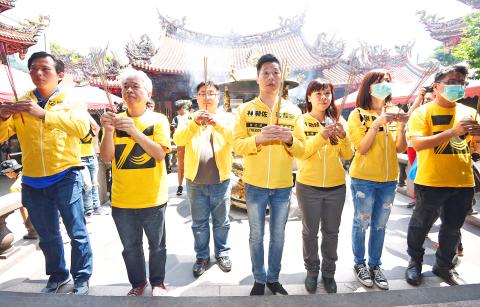The Green Party Taiwan (GPT) yesterday announced its support for social activist Wang Pao-hsuan (王寶萱) as a legislative candidate for next year’s legislative election.
The GPT said that it seeks to bolster its collaboration with its political allies by delineating what the party called “priority bills” regarding environmental protection and land appropriation.
Wang, 33, said she plans to run in Taoyuan City’s Lujhu/Gueishan (蘆竹/龜山) constituency, and seeks to uphold “residential and land justice” if elected.

Photo: Lo Pei-der, Taipei Times
Land expropriation plans are often impractical and formed without comprehensive assessment of local industries, Wang said.
Referring to the Aerotropolis project in Taoyuan City, Wang criticized the project for proposing to establish a special zone dedicated to a hodgepodge of establishments — including hotels, theme parks and shopping malls, as well as farm plots, aeronautics and electronics firms — around Taiwan Taoyuan International Airport, saying the project lacks a plan to attract investment and has not taken existing industries into consideration.
Wang said that the government should not be pursuing impractical developments when current policies have been insufficient in taking care of ranch owners or farmers working in the area, and vowed to push forward legislation to improve the livelihoods of average Taiwanese.
She said that while campaigning, she met a herb farmer surnamed Huang (黃), who lives in Lujhu. He once refined essence oil, but was unable to market it due to government restrictions, she said.
Five years after Huang created the essence oil, a French company was granted permission to sell the exact same product in Taiwan.
“It proves that an industry that is widely viewed as having no added value can be completely reinvented with government support,” she said.
Wang is best known for her active engagement in, and stance against, issues about controversial land expropriation projects, including the Aerotropolis project in Taoyuan City and the MRT A7 affordable housing complex project in Taoyuan's Gueishan Township (龜山).
Meanwhile, the GPT said that it would meet with the New Power Party and Social Democratic Party to identify common goals they hope to achieve for the legislative election, thereby boosting the influence of the “third force.”
The trilateral talk is to focus on bills that the parties hope to pass, their core values and campaign strategies, GPT co-convener Lee Ken-cheng (李根政) said.
Instead of waiting for the government to introduce policies, which often lack clearly defined goals, the parties seek to tackle bills directly to expedite policy enforcement, Lee said.
So far, the three parties seem like-minded and the meeting is aimed at further testing the parties’ cohesion, he said.

The Ministry of Education (MOE) is to launch a new program to encourage international students to stay in Taiwan and explore job opportunities here after graduation, Deputy Minister of Education Yeh Ping-cheng (葉丙成) said on Friday. The government would provide full scholarships for international students to further their studies for two years in Taiwan, so those who want to pursue a master’s degree can consider applying for the program, he said. The fields included are science, technology, engineering, mathematics, semiconductors and finance, Yeh added. The program, called “Intense 2+2,” would also assist international students who completed the two years of further studies in

The brilliant blue waters, thick foliage and bucolic atmosphere on this seemingly idyllic archipelago deep in the Pacific Ocean belie the key role it now plays in a titanic geopolitical struggle. Palau is again on the front line as China, and the US and its allies prepare their forces in an intensifying contest for control over the Asia-Pacific region. The democratic nation of just 17,000 people hosts US-controlled airstrips and soon-to-be-completed radar installations that the US military describes as “critical” to monitoring vast swathes of water and airspace. It is also a key piece of the second island chain, a string of

Taiwan will now have four additional national holidays after the Legislative Yuan passed an amendment today, which also made Labor Day a national holiday for all sectors. The Chinese Nationalist Party (KMT) and Taiwan People’s Party (TPP) used their majority in the Legislative Yuan to pass the amendment to the Act on Implementing Memorial Days and State Holidays (紀念日及節日實施辦法), which the parties jointly proposed, in its third and final reading today. The legislature passed the bill to amend the act, which is currently enforced administratively, raising it to the legal level. The new legislation recognizes Confucius’ birthday on Sept. 28, the

Former president Tsai Ing-wen (蔡英文) departed for Europe on Friday night, with planned stops in Lithuania and Denmark. Tsai arrived at Taiwan Taoyuan International Airport on Friday night, but did not speak to reporters before departing. Tsai wrote on social media later that the purpose of the trip was to reaffirm the commitment of Taiwanese to working with democratic allies to promote regional security and stability, upholding freedom and democracy, and defending their homeland. She also expressed hope that through joint efforts, Taiwan and Europe would continue to be partners building up economic resilience on the global stage. The former president was to first